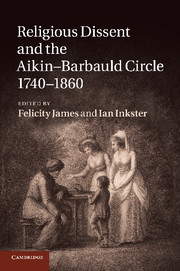Book contents
- Frontmatter
- Contents
- Notes on the editors and contributors
- Foreword
- Acknowledgements
- Chapter 1 Religious Dissent and the Aikin–Barbauld circle, 1740–1860
- Chapter 2 The Revd John Aikin senior
- Chapter 3 How Dissent made Anna Letitia Barbauld, and what she made of Dissent
- Chapter 4 ‘And make thine own Apollo doubly thine’
- Chapter 5 ‘Outline maps of knowledge’
- Chapter 6 ‘Under the eye of the public’
- Chapter 7 ‘The different genius of woman’
- Chapter 8 Lucy Aikin and the legacies of Dissent
- Chapter 9 The Aikin family, retrospectively
- Bibliography
- Index
- References
Chapter 6 - ‘Under the eye of the public’
Arthur Aikin (1773–1854), the Dissenting mind and the character of English industrialization
Published online by Cambridge University Press: 05 November 2011
- Frontmatter
- Contents
- Notes on the editors and contributors
- Foreword
- Acknowledgements
- Chapter 1 Religious Dissent and the Aikin–Barbauld circle, 1740–1860
- Chapter 2 The Revd John Aikin senior
- Chapter 3 How Dissent made Anna Letitia Barbauld, and what she made of Dissent
- Chapter 4 ‘And make thine own Apollo doubly thine’
- Chapter 5 ‘Outline maps of knowledge’
- Chapter 6 ‘Under the eye of the public’
- Chapter 7 ‘The different genius of woman’
- Chapter 8 Lucy Aikin and the legacies of Dissent
- Chapter 9 The Aikin family, retrospectively
- Bibliography
- Index
- References
Summary
The first condition of having to deal with somebody at all is to know with whom one has to deal.
Georg Simmel, 1908The Philosophers . . . are getting up what they are pleased to call a New Aristocracy – an Aristocracy of Science [which] is to be the enemy and ruler of the old one.
David Robinson, 1825Prologue in 1833
At the great public dinner of March 1833 held at Freemason’s Tavern, London, to mark the centenary of the birth of the exemplary Dissenting philosopher Joseph Priestley, leading among the nineteen stewards representing the nation’s ‘Cultivators of Chemical Science’ was Arthur Aikin Esq., FLS. Among the 120 diners were most of the notable Dissenting philosophers of the metropolis, including Arthur’s brother Charles Rochemont Aikin as well as his close chemical associate W. H. Pepys. At 60 years of age Arthur Aikin was firmly ensconced among the foremost chemists of the decade of reform.
Something repeatedly stressed throughout the Priestley commemoration was the notion that the earlier period of ‘political and theological strife’ had passed away, indeed was now replaced by one of greater understanding and intellectual tolerance. By focusing upon the ‘independence of dogma and of preconceived notions’ that characterized Priestley himself, the assorted savants pointed to the relative liberalism that allowed intellectual association and discourse within a Dissenting culture even at a time of extended political crisis and warfare. Although the Home Office had indeed attempted to crack down on such freedoms during the early 1790s and after the end of the Napoleonic Wars, this could now be forgotten in a spirit of progressive liberalism and victorious intellectual endeavour. A former pupil of Priestley – as had been his father – Arthur Aikin centred on his own direct debt to the great philosopher while ‘employed in assisting Dr Priestley in his laboratory when he removed from Birmingham to Hackney’. We may thus fairly claim that Arthur Aikin stood at the epicentre of those associations and networks that linked the worlds of Dissent, intellect and industry. Furthermore, as was illustrated in later remarks made at that dinner by Aikin’s collaborator W. H. Pepys, these two and several other practising chemists owed directly to Priestley the cultural identity of intellectual Dissent, scientific enquiry and practical laboratory manipulation, a nexus not then found in any English university or in any English royal society. In this chapter we wish to explore the particular micro-culture of Dissent and intellectual enquiry established by Arthur Aikin’s father and grandfather, and its later elaborations by Arthur and his brothers in their work on geology, chemical applications, medicine and architecture.
- Type
- Chapter
- Information
- Religious Dissent and the Aikin-Barbauld Circle, 1740–1860 , pp. 126 - 155Publisher: Cambridge University PressPrint publication year: 2011



